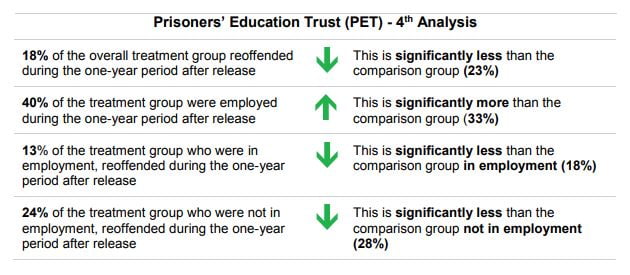The value of learning in prison
This is a guest post by Rod Clark, Chief Executive of the Prisoners’ Education Trust.
Back in 2016 the Prisoner Learning Alliance (PLA) together with New Philanthropy Capital published a report about why education in prison is important and valuable. Called What is prison education for? A theory of change exploring the value of learning in prison, it drew on a series of workshops with education practitioners and former prisoners. The message was clear: education in prison offered a number of benefits in helping people to change their lives for the better.
One participant told researchers, “Education gave me empathy. Before I didn’t care about anyone or myself. I thought I was broken. I care about people now and I care about myself. Others’ kindness helped me gain empathy.”
Another said, “I guess education was the start of my journey into this new life… since I’ve been released I’ve crammed in ten times the amount of things than in the previous twenty years. It’s been colourful, varied and bright.”
The findings drew also on the work of academics to group the benefits under a number of headings: wellbeing, human and social capital, the culture of the prison, and knowledge, skills and employability.
The link to employment was certainly seen as important. One participant said, “I thought studying to be a personal trainer was a realistic goal that linked to my dream to work in sport. Education made me think – I can do this. I enjoy it, but it also pays the bills.”
Education can undoubtedly help prisoners find work, and research has previously demonstrated that prisoners who get jobs on release reoffend less. But is that the only role that education plays in helping people to straighten out their lives?
Teachers, prisoners and academic researchers would suggest not. But we have not had hard-edged statistical evidence to support that. That is until now.
This month, the Justice Data Lab (JDL) – a team of statisticians at the Ministry of Justice – published a new analysis looking at people who had been helped by Prisoners’ Education Trust (PET) to study distance learning courses in prison.
With the help of the DWP, HMRC and the Police National Computer, the team could look at the employment and reoffending records in their first year of release for over 9,000 people supported by PET. They were then able to compare the outcomes for these people with a matched group of similar prisoners that hadn’t been supported by PET.
I’m pleased to say that this new analysis confirms the results from earlier studies that our support reduces the chance of someone returning to prison, and increases their chance of finding work.
However in this latest experimental analysis the JDL team went further – to explore more deeply the relationship between support from PET, employment and reoffending. In a nutshell, the research tells us three key things about the people we support in prison:
- They are more likely to get work than prisoners we do not support.
- Even if they do not find work, they still go on to reoffend less than other prisoners who do not find work.
- And if they do find work they are even less likely to reoffend than other prisoners who find work.
These Justice Data Lab results cannot throw light on exactly why people go on to reoffend less after getting an education in prison – whether it’s through improved wellbeing, finding the self-belief and confidence to change, or something else. But they do show that the PLA’s theory of change is right: the positive impact of education goes beyond simply finding employment.
Many teachers and learners will not have needed convincing of the wider benefits of education. But it is hugely helpful to have that proven in thorough statistical analysis. The Justice Data Lab evidence further strengthens the already strong case for the value of education in custody.
Thanks to Ian Cuthbert & the Prisoners’ Education Trust for permission to use the header image.










2 Responses
Thank you, it’s really encouraging to read this article. I work in prison education and I’m very proud of the workshop I run, teaching a vocational course. I’m looking at ways to teach the learners further on how to gain employment and the importance of gaining as quickly as possible upon release but I am aware this is not easy for all. I would have my door open to any construction company that wants to see the level of education on offer in prison and could turn their head to give someone a chance. There’s a long way to go, but rehabilitation starts with an education and ends with a career.